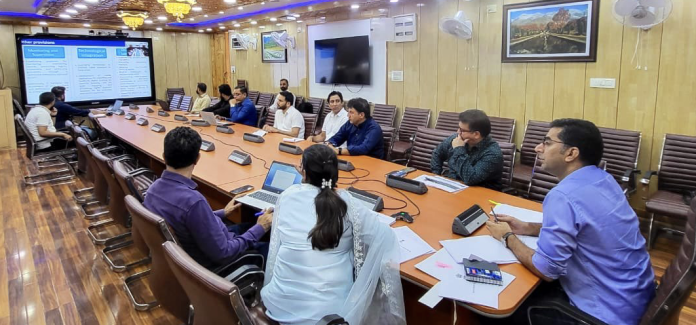SRINAGAR: To finalize the draft Operation and Maintenance (O&M) policy of Swachh Bharat Mission- Grameen (SBM-G) assets in rural areas of J&K, Secretary Rural Development Department (RDD) and Panchayati Raj, Dr. Shahid Iqbal Choudhary today reviewed the proposal for user charges for door-to-door collection and O&M policy of sanitation assets.
The meeting was attended by Director General Rural Sanitation, Anoo Malhotra; Director Finance RDD, Director Rural Development Kashmir, Director Rural Development Jammu, Director Panchayati Raj, Additional Secretary (W&S), Additional Secretary Legal, Additional Secretary RDD and others concerned officers.
Under the proposed structure, in terms of the provisions of the J&K Panchayati Raj Act, the village level committees are to be empowered for effective planning including user charges for households, commercial establishments and institutions based on economics of local waste management requirements.
The charges will vary depending on the density of households and the level of commercial activity in the village, with tiered rates for different categories.
The move aims to ensure proper upkeep of sanitation assets created under the Swachh Bharat Mission (Grameen) and involve the village communities in planning, operation and management of assets under the scheme.
The Secretary highlighted the critical importance of community involvement in the Operation and Maintenance (O&M) policy for rural sanitation under the Swachh Bharat Mission.
Dr. Shahid Iqbal emphasized that while the Government of India provides funding for these initiatives, a sustainable model, especially achieving ODF (Open Defecation Free) plus status, hinges on the community’s responsibility for operational maintenance.
The Secretary said that besides creation of infrastructure and development of Human Resource for scientific waste management it is imperative to actively associate and engage the village community in overall planning and management as envisaged under the SBM guidelines.
The meeting underlined the need for a comprehensive implementation plan through the Gram Panchayat Sanitation Committees, which would be pivotal in ensuring the success of the policy.
It also discussed the potential for involving public-private partnerships, CSR responsibilities, and educational institutions to support these efforts, indicating that the financial aspect and community involvement are key to the policy’s success.
The Director General Rural Sanitation, Anoo Malhotra, gave a detailed presentation on the O&M policy for sanitation assets in rural areas of Jammu and Kashmir.
She emphasized the importance of ensuring long-term sustainability of these assets. The O&M policy, according to her, outlines clear objectives, establishes a robust institutional framework, and details strategies for effective resource mobilization.
She emphasized the importance of clearly defined goals for the operation and maintenance of these assets. Additionally, she highlighted the need for defining roles and responsibilities for all stakeholders involved in the O&M process.
She also stressed the significance of integrating various government schemes to support O&M activities. Furthermore, she discussed the exploration of potential funding options, including user charges, and the possibility of involving external agencies to provide O&M services.
After inclusion of suggested recommendations, the draft policy will be put in public domain for seeking feedback and suggestions.


